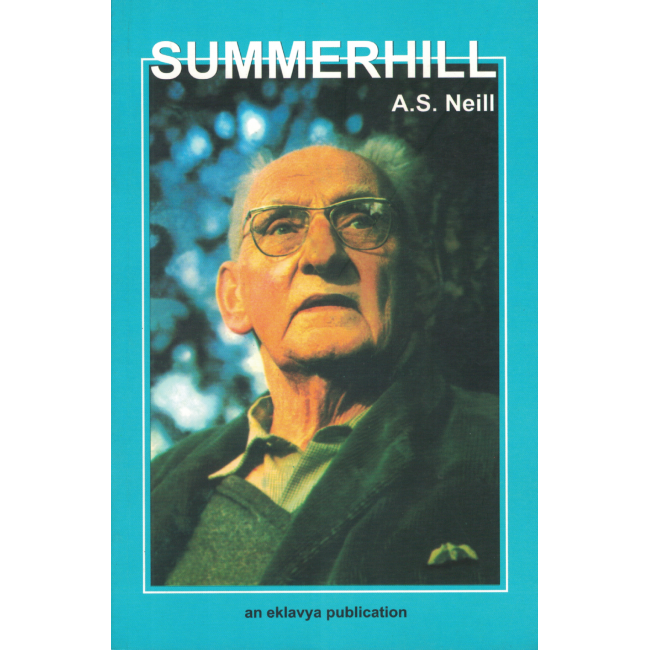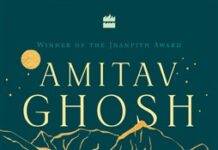“I would rather see kids become happy taxi drivers, then neurotic professors.”
-A.S. Neill
Summerhill is the name of a school. Summerhill is also the name of a book written by A. S. Neill who founded this school in 1921. This story is both about the school and its extraordinary founder. Even though no school like this exists in India today, every parent will profit by reading this book. The book will challenge parents to rethink their own approach to their children. Thoughtful parents will be shocked to realize the extent of pressure and power that they unwittingly use against their children. This book will provide new meanings for words like love, approval and freedom.

The school has been around for over 85 years. It is surprising that only 800 children have passed out from this school during its long existence. The massive impact Summerhill has had on libertarian education across the world is totally disproportionate to its miniscule size.
Neill was a stringent critic of modern society. Schools today develop a kind of a person which we call a mass-man. Schools have become giant factories churning out kids who must fit into the present order, who cooperate smoothly, and who consume more and more. The present system must create children whose tastes are standardized, people who can be easily influenced and whose needs can be easily anticipated and quantified. The system needs men and women who feel free and independent but who are willing to do what is expected of them. People who fit into the social machine without friction and who can be swayed by national jingoism, religion, caste, patriotism or the scores of babas who masquerade as god incarnate.
Summerhill showed the world that a school could abolish fear of teachers and adults and, deeper down, fear of life. Staff at Summerhill does not stand to their dignity, nor do they expect any deference because they are adults. They are addressed by their first names and are seldom given nicknames. For thirty years, George Corkhill, the school science master was George, or Corks or Corkie. Every child loved him.
Neill was deeply influenced by the experiments of Homer Lane’s “Little Commonwealth” who started a reformatory for delinquent children. Punishments and prison sentences cannot reform a criminal, because to him they are only a proof of society’s hate. The first essential of any reform school is the chance of social approval. As long as children have to salute the warden, overseer, jump up when the superintendent enters the room there would be no real freedom, and hence no room for social approval. The great lesson Neill learnt from Homer was, “Always be on the side of the child.”
So, when children stole, instead of being reprimanded they were given a small prize – a token of social approval and soon they overcame this habit. Summerhill often got children who were socially traumatized, some of them expelled from normal schools. This little incident stands out as Neill’s genuine love and respect for children. Once, a nine year old boy came to Summerhill. The boy was literally dragged to school, as he had
awful experiences in his previous schools and had sworn never to attend one in future. The boy was in a terrific rage. The boy picked up a stone and threw it on a glass window. The glass shattered to pieces. Neill who was standing nearby just kept mum and looked on. The boy broke several panes. After a while the boy got exhausted and started panting. Neill kept quite. In the end Neill picked a stone and broke a glass pane himself! Be on the side of the child. It was no point sermonizing to a child in distress – a traumatized child.
Summerhill does not expound a theory. It is a sensitive recapitulation of over half a century of experiences with real children. “Freedom works” is one slogan which emerges from the book.
Neill like many other thinkers before him maintains firm faith “in the goodness of the child”. He believes that an average child is not a cripple, a coward or a soulless automaton, but is full of life’s potentialities. The aim of all life and that of education was to work joyfully and find happiness. Neill was deeply influenced by Wilhelm Reich the most promising student of Sigmund Freud. Reich in his many books “Listen Little Man”, “The Mass psychology of Fascism” and the “Function of the orgasm” tried to probe deep into the roots of repression and neurosis and the wellsprings of happiness.
In modern society there is an increasing separation between intellect and feelings. The purpose of education is not just to “externally plaster” a vague curriculum but to make a child feel with the heart, see with the eyes and hear with the ears. A child is self-centred and incapable of the altruism of a mature adult. It is erroneous to expect something from a child which he/she is not capable of.
Dogmatic discipline and punishment creates fear and hostility. This paralyzes the self- initiative and activity of children and may be harmful for their psychic development.
One of Neill’s doctrine is “Freedom – not license.” He also wrote a book by this name. It means that respect for the individual must be mutual. Both adults (teachers) and students (children) must have mutual respect for each other. For instance, Neill would not enter a child’s room, or use a child’s bicycle without the child’s permission. Nor could children use Neill’s tool-box, or borrow his personal books without his explicit permission.
In over fifty years of working with children Neill never lied to a child. Anyone who reads this book will be convinced that this is not boasting but a simple truth. Truth begets truth.
The child must learn independence and learn to face the world as an individual. He must try and find security not through submission or domination to adults, parents, teachers, religion, but by grasping the world intellectually, emotionally and artistically. Guilt feelings primarily have the function of binding the child to authority. They are an impediment to independence. Neill rebels against the anti-life notion of many religions which preach that man was “born in sin”. Summerhill does not offer religious education. This does not mean that Summerhill is not concerned with humanistic values. Neill puts it succinctly. “The battle is not between believers in theology and non-believers in
theology, it is between believers in human freedom and in the suppression of human freedom.” The author continues, “Someday a new generation will not accept the obsolete religion and myths of today. When the new religion comes, it will refute the idea of man’s born in sin. A new religion will praise God by making men happy.”
Summerhill remains the freest school in the world. The key to its success was to give children freedom to play for as long as they felt the need in an atmosphere of approval and love. Children were free to attend or not attend classes or just do what they liked – tinker in the workshop, climb trees or skate around the campus. Children could choose their subjects and their teachers of their liking. The children were allowed to do what they liked to do as long as they did not bother anyone else. This is what Neill meant by freedom – not license. You had a right to do what you want to do as long as you did not interfere with the freedom of others.
And despite no compulsion to attend classes the young kids at Summerhill almost go to lessons eagerly. Older kids also seem very interested and cheerful in school. However, children between 10 to 12 years spend very little time on lessons.
The social control of Summerhill is invested in the entire community. Every week, for over eight decades children in Summerhill have settled down after supper on Saturday for a General Meeting. They make laws, change rules and see to their implementation. Issues and proposals are decided by popular vote. The children, the teachers, and even the principal have the same vote. Most of Neill’s proposals were intentionally silly and were always voted down by children. Each new generation of Summerhill kids quickly learn the subtleties of their self-government.
Despite the freedom children soon learn that if they wish to do things they want, then they need an academic degree. Children spontaneously work for it and also do well at it. There is the story of the boy who spent over 12 years in Summerhill without ever attending classes. He was fond of tinkering and would be making, doing things in the workshop. In all these years he did not even learn to read and write. Later, being skilled with his hands he got a job in a factory. Soon, he had to read a technical manual. Initially, he couldn’t read it. But soon he learnt to read and write well and was still very happy doing what he did.
Summerhill has produced many-many happy human beings, not all necessary big “stars”. Amongst them have been many wonderful musicians, artists, writers, historians, and scientists. For many years the book “Summerhill” could be easily bought and read. Unfortunately, for many years it has been out of print. After a long correspondence with Neill’s daughter Zoe Readhead (the current Principal of Summerhill), the book has just been reprinted in India by Eklavya, E-10, Shankar Nagar, BDA Colony, Bhopal 462016 (MP). It is priced at Rs 175/- . The book can also be ordered online (books@eklavya.in). Eklavya has also published a beautiful Hindi translation of this classic. The Marathi edition is being published by Rajhans, Pune.
There is a wonderful 20-minute film on Summerhill, which can be viewed from Arvind Gupta’s website http://arvindguptatoys.com
A lifelong commitment to education and a passion for children mark Arvind Gupta’s fascinating story as an educator who has dedicated his life to innovative teaching through the creation of toys and tools with materials discarded as waste. His website www.arvindguptatoys.com continues to be a growing online resource of teaching-learning material and enduring classics from the field of education and culture.










